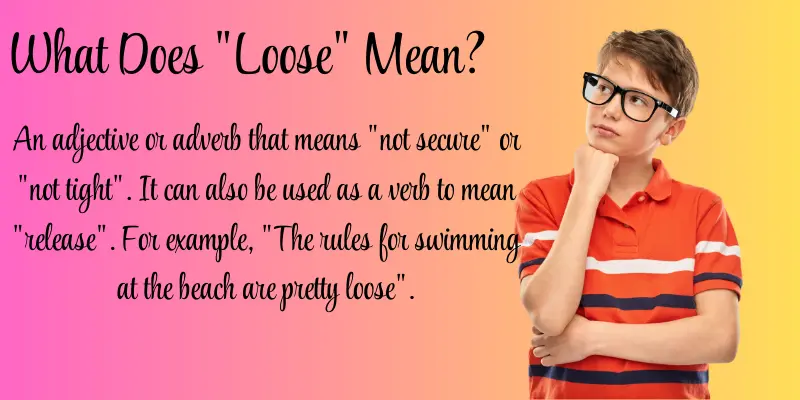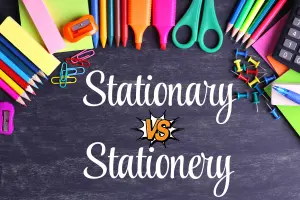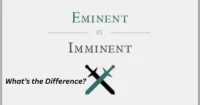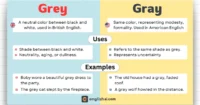Loose vs Lose – A Guide to Mastering the Difference
Published: 26 Nov 2024
Have you ever found yourself stuck wondering whether to write “loose” or “lose”?
You’re not alone!
These two words, loose vs lose, sound similar, but they have different meanings, and using them correctly can make your writing clearer and more professional.
In this article, we’ll break down the differences and provide some fun tips to help you remember them!
Quick Cheat Sheet for Loose vs Lose
| Word | Part of Speech | Meaning & Usage |
| Loose | Adjective/Verb | Not tight or securely attached, free from restraint |
| Lose | Verb | To misplace, fail to keep, or suffer a loss |
What Does “Loose” Mean?

The word loose is most commonly used as an adjective, but it can also be a verb. Here’s how you can use it:
Loose as an Adjective:
- Not securely attached: “The floorboards are coming loose.”
- Not tight-fitting: “Peter’s belt is too loose.”
- Free from restraint: “There was a loose dog in the park.”
- Not solid or compact: “The soil was loose, making it easy to plant the tree.”
Loose as a Verb:
- To release or untie: “She loosed the knot and opened the box.”
- To make something less tight: “Don’t let the dog loose in the street!”
Common Expressions with Loose:
- All hell breaks loose: Chaos ensues.
Example: “All hell breaks loose when the power goes out.” - Loose change: Small coins.
Example: “I found some loose change in my pocket.” - Loose-lipped: Unable to keep a secret.
Example: “He’s very loose-lipped; I wouldn’t trust him with confidential info.”
What Does “Lose” Mean?

The word lose is always a verb. It refers to failing to keep, misplacing something, or suffering a loss.
Lose as a Verb:
- To misplace something: “Don’t lose your keys!”
- To fail to win: “We can’t afford to lose this game.”
- To suffer a loss: “It’s hard to lose a loved one.”
- To get rid of something: “She wanted to lose weight this year.”
Common Expressions with Lose:
- Lose face: To lose someone’s respect.
Example: “You’ll lose face if you tell that lie.” - Lose heart: To become discouraged.
Example: “Don’t lose heart; you’re doing great!” - Lose sleep: To worry excessively.
Example: “Don’t lose sleep over it; everything will be fine.” - Lose your nerve: To become afraid or anxious.
Example: “It’s normal to lose your nerve before a big presentation.”
Loose vs Lose in Sentences
Here are some sentences to highlight the difference between loose vs lose:
Using “Loose” in Easy Sentences:
- My shirt is too loose.
- The dog is loose in the yard.
- The screw is loose.
Using “Lose” in Easy Sentences:
- Don’t lose your pen.
- He doesn’t want to lose the game.
- I lose my keys often.
How to Remember the Difference
It’s easy to mix up “lose” and “loose,” but here are some quick memory tricks to help:
- Think of the “O” in “Loose”: Loose has two “O”s. Imagine “O” for “open,” like a loose shirt or a loose button—things that have room to move around.
- Remember the “Tightness”: Loose means something that isn’t tight (e.g., loose shirt), while lose refers to misplacing or failing to keep something (e.g., lose your keys).
Practice Makes Perfect:
Test Yourself!
Fill in the blanks with the correct word, “loose” or “lose”:
- Don’t let the dog get _______ in the yard. (loose / lose)
- He was afraid to _______ his temper during the argument. (loose / lose)
- I hope we don’t _______ our keys at the park! (loose / lose)
- The screws are too _______ on the shelf. (loose / lose)
Answers:
- Loose
- Lose
- Lose
- Loose
Common Mistakes to Avoid
It’s easy to make mistakes when typing quickly, so be sure to double-check your usage of loose and lose. Here are some common errors:
- Incorrect: “I don’t want to loose my job.”
- Correct: “I don’t want to lose my job.”
- Incorrect: “The screws are too lose on the shelf.”
- Correct: “The screws are too loose on the shelf.”
Key Takeaways
Here’s a quick recap to make sure you’ve got the difference down:
- Loose: Used to describe something that’s not tightly fastened, not compact, or free from restraint.
- Example: “The dog got loose from its leash.”
- Lose: Refers to misplacing, failing to keep, or suffering a loss.
- Example: “I’m afraid I might lose my keys.”
Bonus Tips for Remembering Loose vs Lose
Here are some bonus tips for remembering loose vs lose:
- Think About the O’s:
- “Loose” has two “O”s, which can remind you that it means something is free or not tight, like a loose shirt.
- “Lose” only has one “O,” which can help you remember it’s about misplacing something or not winning.
- Practice Makes Perfect:
- The more you use “lose” and “loose” in your writing, the easier it will be to get them right. Try making a few sentences with each word!
- Picture a Rope:
- Imagine a rope to help you remember: “Loose” is when the rope is hanging freely, and “Lose” is when you can’t find the rope anymore because it’s been misplaced.
- Try This Trick:
- Think of “lose” as something you “lose” (like your phone), and “loose” as something free or not tight, like a loose button.
- Check the Situation:
- If you’re talking about something that isn’t tight or is free, use “loose.”
- If you’re talking about misplacing something or not winning, use “lose.”
- Let Technology Help You:
- Use tools like Grammarly to double-check your writing and make sure you’re using the right word. It can save you from spelling mistakes and help your writing shine!
Conclusion
Now that you know the difference between loose vs lose,” you can confidently use them in your writing and conversation. Here’s a quick recap:
- Loose = not tight, free, or relaxed (Adjective/Verb).
- Lose = to misplace, fail to keep, or suffer a loss (Verb).
With a little practice and the helpful tips above, you’ll never confuse these words again. So, go ahead and start using them correctly to improve your writing and speaking!
Quick Tip: If you’re describing something, it’s likely loose. If you’re talking about an action, it’s probably lose.
FAQs
Which is correct, loose or lose?
Both loose and lose are correct, but they have different meanings and uses:
- Loose (with two “o”s) is usually an adjective that means not tight or not firmly fixed.
Example: “My shoes are loose, so I need to tighten them.” - Lose (with one “o”) is a verb that means to misplace, fail to keep, or suffer a loss.
Example: “Don’t lose your keys!”
What is loose or lose meaning?
Loose
- Meaning: Loose is an adjective or adverb that describes something not tight, secure, or firmly fixed. It can also be used as a verb meaning “to release” or “set free.”
- Example: The dog managed to slip out because the gate was loose.
Lose
- Meaning: Lose is a verb that means to misplace something, fail to keep something, or suffer a loss.
- Example: I hope I don’t lose my wallet!
Did you lose or loose weight?
Lose weight is the correct phrase.
- Lose is a verb that means to no longer have something, like when you shed pounds or misplace an item. It has a long “o” sound (like in “go”) and a “z” sound (like in “zebra”).
Example: She worked hard to lose weight.
- On the other hand, loose is an adjective meaning not tight or secure. It has a different pronunciation, with a soft “o” sound (like in “food”).
Example: The shirt was too loose after he lost weight.
So, when you’re talking about reducing weight, always use lose!
Is it “I lost my keys” or “I loose my keys”?
The correct phrase is “I lost my keys.” “Lose” is the verb you use when you can’t find something.
Is it “loose hair” or “lose hair”?
The correct phrase is “loose hair.” This means hair that is not tied up or secured.

- Be Respectful
- Stay Relevant
- Stay Positive
- True Feedback
- Encourage Discussion
- Avoid Spamming
- No Fake News
- Don't Copy-Paste
- No Personal Attacks



- Be Respectful
- Stay Relevant
- Stay Positive
- True Feedback
- Encourage Discussion
- Avoid Spamming
- No Fake News
- Don't Copy-Paste
- No Personal Attacks





